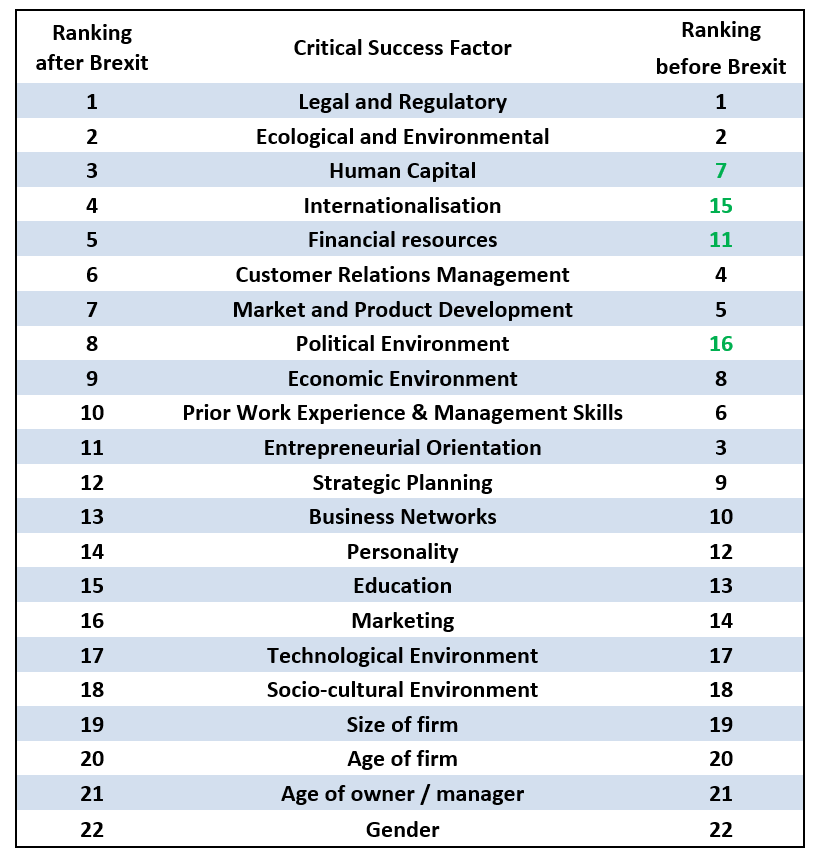Small and medium enterprises have a large presence in chemical distribution, an industry that contributes to the UK’s economy and employment. Brexit, however, presents a few new challenges to these businesses. Among the key factors for the success of smaller chemical distributors, Evripidis (Evri) Lampadarios and Niki Kyriakidou highlight the importance of coping with the changing regulatory landscape.
Small and medium-sized enterprises (SMEs) continue to be the focus of political, business and management research with their benefits firmly embedded in the business literature. SMEs are integral to contemporary economic and social regeneration, essential for the establishment of a solid industrial base, key drivers for innovation and R&D and above all significant contributors to employment generation.
An industry where small businesses have a particularly strong presence is chemical distribution in the UK, a growing, well-established, significant part of the chemical industry and a significant contributor to the economy and employment.
Critical success factors for SMEs are not only dependent upon the country and industry settings but are also influenced by any radical changes in the wider business environment. Recent events in the European political arena have altered the landscape and increased the level of volatility and uncertainty. The result of the British referendum (June 2016) has triggered an unprecedented set of events, addressed under the ‘Brexit’ umbrella, leading Europe and the UK into unchartered territory alongside with all businesses based on and/or operating in this geographical region. The impact of such radical change on the critical success factors (CSFs) for SMEs in the UK chemical distribution industry, as identified in a previous study by Lampadarios (2016), has been investigated.
The total number of SMEs in the UK chemical distribution industry satisfying the criteria was 180. No sampling technique was used but instead a census was conducted. Owners and very senior managers (chief executives, managing directors and directors) were the key informants. A total of 126 SMEs responded positively by returning the questionnaire, in a usable and valid form for statistical analysis, generating an overall response rate of 70%; this is against 118 respondents, 65.5% participation, in the pre-Brexit study. Thus, it can be argued that the findings of this study offer an accurate representation of SMEs operating in the UK chemical distribution industry.
This study established a positive relationship between 11 success factors and SME success in the UK chemical distribution industry: regulatory compliance, human capital, internationalisation, financial resources, customer relations management, market and product development, political environment, economic environment, prior work experience and management skills, entrepreneurial orientation, and strategic planning. This further reinforced the previous study by Lampadarios (2016) which identified eight success factors, namely regulatory compliance, entrepreneurial orientation, customer relations management, market and product development, prior work experience and management skills, human capital, economic environment, and strategic planning. Please see Table 1.
Table 1. Critical success factors for SMEs before and after Brexit

Overall, SME success in the UK chemical distribution industry is found to be dependent upon many factors being optimal simultaneously. In fact, it is a combination of factors and not a selected few that leads to business success; satisfying one or two factors does not necessarily guarantee success. In other words, this research recognises and establishes SME success as a multidimensional phenomenon, affected by both firm-internal (enterprise) and firm-external (entrepreneurial and business environment) factors. The general view of this study is that if small businesses strive towards satisfying the identified critical success factors (CSFs) then they will be successful and achieve sustainable growth. During this process and since change is identified as the one constant feature to be faced by chemical distributors in the future, flexibility and adaptability are deemed very important assets for SMEs in the selected industry. The ability to keep changing and adapting to new market conditions quickly is also considered a key to success and sustainable growth.
The most important factors affecting the success of SMEs in the UK chemical distribution market continue to be legal and regulatory, and ecological and environmental. Complying with current legal requirements, coping with strong regulatory trends, and overcoming future regulatory challenges are seen as critical in the success of small businesses in this industry. Inevitably, all SMEs operating in the UK and European chemical distribution industry must fully implement the measures necessary to comply with regulations otherwise face the real risk of being excluded from the market. A compliance strategy needs to be developed and implemented while a long-term, flexible outlook on regulatory requirements, especially on REACH (Registration, Evaluation, Authorisation and Restriction of Chemicals) and competition law, must be maintained. This becomes even more critical in the era of Brexit, as the UK detaches itself from the European Union, where regulatory changes are to be expected. Once again, the uncertainty of whether laws, regulations and requirements will change, be modified, or even abolished—not to mention the introduction of new ones—reinforces the criticality of compliance.
Initially, it appears that there have been no significant changes in the factors that are critical to SME success in the UK chemical distribution industry. However, upon closer examination, a distinct shift within the success factors is noted. In more detail, certain factors, namely:
(i) the political environment incorporating political stability, absence of internal conflict and tensions, internal and foreign investment, exchange rate fluctuations, formulation of new relevant laws and regulations, tax policies, financial support and loans, the provision of education, training, infrastructure, and advisory services
(ii) financial resources level of capitalisation, available government and private funding, cash flow management, additional and unexpected expenses necessary to conduct business and
(iii) internationalisation in the form of new trading agreements with the EU and other major exporting markets, planned outward movements, revising exporting strategies that were previously not considered critical are now deemed as highly influential in the success of small businesses in the specific industry.
The fact that the number of success factors has increased from eight to eleven further suggests that Brexit has created a far more complex and challenging environment for UK small and medium-sized chemical distributors to operate in. In other words, Brexit has destabilised the environment small businesses operate in and has inevitably altered the perceptions of owners/managers on which factors are now critical to success.
♣♣♣
Notes:
- This blog post is based on the authors’ book chapter Critical Success Factors for SMEs in the UK Chemical Distribution Industry: The ‘Brexit’ Effect, in The Changing Role of SMEs in Global Business, Volume I: Paradigms of Opportunities and Challenges, Eds: Thrassou, A., Vrontis, D., Weber, Y., Shams, S.M.R., Tsoukatos, E., Palgrave Macmillan, pp. 155-177
- The post gives the views of its authors, not the position of LSE Business Review or the London School of Economics.
- Featured image by deepakrit under a Pixabay licence





